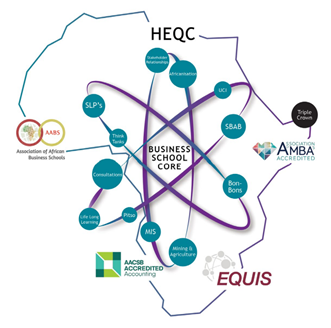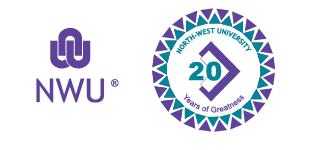Project Proton
In our mission, the following is mentioned: “Collaborating with stakeholders in addressing socio-economic development challenges”. An illustration of this commitment is our strong focus on developing the local business and entrepreneurial community. An emphasised aspect is our attention to addressing the challenges of Africa, such as inequalities and corruption. Our strategic direction for the next five years is visible in PROJECT PROTON, as depicted in the diagram below.

From the end of 2020, when our new strategic direction was finalised, the school started with a variety of new initiatives to illustrate our commitment to the new strategic goals. An additional aim was to enhance our new corporate identity. These new initiatives, such as the monthly Think Tanks, Business in Africa webinars, and African Bonbons, were developed to stimulate critical thinking and reasoning, foster reflexivity, debate possible solutions to challenges and identify research areas on the AU Agenda 2063 and UN Agenda 2030 Sustainable Development Goals (SDG) in Africa.
Opportunities for the NWU-BS are to equip business leaders with additional skills needed to develop a cross-cutting but realistic agenda to address the socioeconomic challenges for the country and for the continent. The school has identified the mining, agricultural and government sectors as target markets. In these sectors, socio-economic developments are addressed through education in the small and medium business sector and by emphasising ethical leadership to address corruption.
At this moment, South Africa is a country with numerous challenges. These challenges relate to the poor economic growth in the country and widespread corruption, which have led to the degradation of infrastructure and the lack of ethical leadership. Considering the lack of economic growth and the need for development in the country, business education is undoubtedly a key constituency in the political economy of South Africa and its constructive participation can deliver essential gains to the economy. Business is an agent of change.
The key opportunities facing the business sector are therefore to enlarge its sphere of influence, adopt a strategic focus, invest in building capacity, and exercise leadership in a changing socio-economic environment.
Based on our strategic direction and to incorporate responsible management, the NWU-Business School has identified the following areas that we prefer to be involved in:
- Reducing poverty, inequalities and focusing on sectors for job creation, for example, mining and agriculture.
- Focusing on the fight against corruption and poor governance.
- Promoting awareness on sustainability of the environment, whether it is on sustainable food, water, biodiversity or renewable energy.
- All the above need to be addressed within the extension of our African footprint.
Combatting corruption
The NWU Business School establish a specialised unit for corruption and integrity studies.
The enhancement of sustainable economic growth is one of any business school’s focus areas and the NWU BS is no exception to this. Research shows that “in this complex world, corruption, or the overreach of public power for personal profit, has become a problem that affects most of the political, social and economic actions of a society. [Corruption] slows economic growth and development, dedebilitates democratic institutions, and produces governmental uncertainty and instability, which can lead to crime and homicides. Moreover, poverty and corruption are likely to increase because of the lack of opportunities and the decrease in social investments and economic growth. Economic growth is debilitated because investment decline due to the increase in transaction costs”.
The NWU BS wants to differentiate itself as a respected contributor to economic growth and voice of reason by means of a distinctive commitment to raising awareness of the perils of corruption and cultivating business leaders with integrity and exceptional governance principles. The Unit for Corruption and Integrity Studies (UCIS) aims to achieve this through:
- targeted leadership development;
- thought leadership; and
the establishment of influential platforms and networks.
